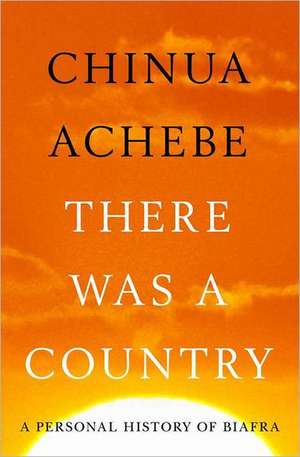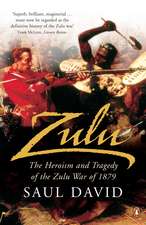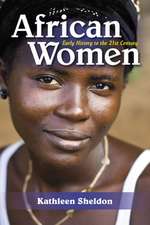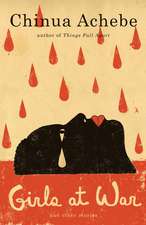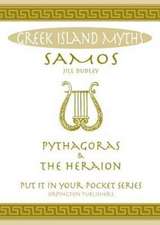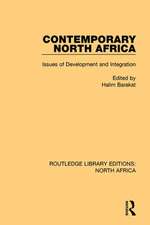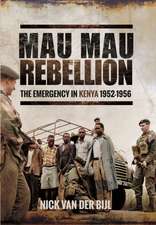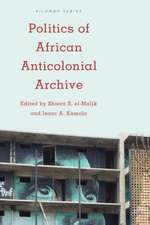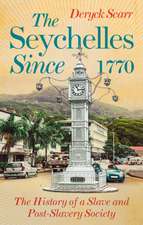There Was a Country: A Personal History of Biafra
Autor Chinua Achebeen Limba Engleză Hardback – 10 oct 2012 – vârsta de la 18 ani
Vezi toate premiile Carte premiată
Hurston/Wright LEGACY Award (2013)
From the legendary author of Things Fall Apart comes a longawaited memoir about coming of age with a fragile new nation, then watching it torn asunder in a tragic civil war
The defining experience of Chinua Achebe’s life was the Nigerian civil war, also known as the Biafran War, of 1967ߝ1970. The conflict was infamous for its savage impact on the Biafran people, Chinua Achebe’s people, many of whom were starved to death after the Nigerian government blockaded their borders. By then, Chinua Achebe was already a world-renowned novelist, with a young family to protect. He took the Biafran side in the conflict and served his government as a roving cultural ambassador, from which vantage he absorbed the war’s full horror. Immediately after, Achebe took refuge in an academic post in the United States, and for more than forty years he has maintained a considered silence on the events of those terrible years, addressing them only obliquely through his poetry. Now, decades in the making, comes a towering reckoning with one of modern Africa’s most fateful events, from a writer whose words and courage have left an enduring stamp on world literature.
Achebe masterfully relates his experience, bothas he lived it and how he has come to understand it. He begins his story with Nigeria’s birth pangs and the story of his own upbringing as a man and as a writer so that we might come to understand the country’s promise, which turned to horror when the hot winds of hatred began to stir. To read There Was a Country is to be powerfully reminded that artists have a particular obligation, especially during a time of war. All writers, Achebe argues, should be committed writers—they should speak for their history, their beliefs, and their people.
Marrying history and memoir, poetry and prose, There Was a Country is a distillation of vivid firsthand observation and forty years of research and reflection. Wise, humane, and authoritative, it will stand as definitive and reinforce Achebe’s place as one of the most vital literary and moral voices of our age.
The defining experience of Chinua Achebe’s life was the Nigerian civil war, also known as the Biafran War, of 1967ߝ1970. The conflict was infamous for its savage impact on the Biafran people, Chinua Achebe’s people, many of whom were starved to death after the Nigerian government blockaded their borders. By then, Chinua Achebe was already a world-renowned novelist, with a young family to protect. He took the Biafran side in the conflict and served his government as a roving cultural ambassador, from which vantage he absorbed the war’s full horror. Immediately after, Achebe took refuge in an academic post in the United States, and for more than forty years he has maintained a considered silence on the events of those terrible years, addressing them only obliquely through his poetry. Now, decades in the making, comes a towering reckoning with one of modern Africa’s most fateful events, from a writer whose words and courage have left an enduring stamp on world literature.
Achebe masterfully relates his experience, bothas he lived it and how he has come to understand it. He begins his story with Nigeria’s birth pangs and the story of his own upbringing as a man and as a writer so that we might come to understand the country’s promise, which turned to horror when the hot winds of hatred began to stir. To read There Was a Country is to be powerfully reminded that artists have a particular obligation, especially during a time of war. All writers, Achebe argues, should be committed writers—they should speak for their history, their beliefs, and their people.
Marrying history and memoir, poetry and prose, There Was a Country is a distillation of vivid firsthand observation and forty years of research and reflection. Wise, humane, and authoritative, it will stand as definitive and reinforce Achebe’s place as one of the most vital literary and moral voices of our age.
Preț: 159.40 lei
Nou
Puncte Express: 239
Preț estimativ în valută:
30.50€ • 31.52$ • 25.37£
30.50€ • 31.52$ • 25.37£
Carte indisponibilă temporar
Doresc să fiu notificat când acest titlu va fi disponibil:
Se trimite...
Preluare comenzi: 021 569.72.76
Specificații
ISBN-13: 9781594204821
ISBN-10: 1594204829
Pagini: 352
Ilustrații: 6 illus + 2 maps
Dimensiuni: 168 x 231 x 36 mm
Greutate: 0.59 kg
Ediția:New.
Editura: Penguin Press
ISBN-10: 1594204829
Pagini: 352
Ilustrații: 6 illus + 2 maps
Dimensiuni: 168 x 231 x 36 mm
Greutate: 0.59 kg
Ediția:New.
Editura: Penguin Press
Recenzii
"Achebe writes in a characteristically modest fashion. It is without restraint but not without tact that his body of work has protested mediocrity in its various forms, from the British colonial apparatus, to the world’s ignorance of African literatures, to the corrosive mismanagement that has plagued Nigeria. Like much of Achebe’s other work, this book about the progress of war and the presence of violence has a universal quality. In a world where sectarian hatreds augmented by political mediocrity have fractured Syria and threaten to bring Israel and Iran to blows, There Was a Country is a valuable account of how the suffering caused by war is both unnecessary and formative."
—Newsweek
"Memoir and history are brought together by a master storyteller."
—The Guardian
Advance Praise:
"Chinua Achebe's history of Biafra is a meditation on the condition of freedom. It has the tense narrative grip of the best fiction. It is also a revelatory entry into the intimate character of the writer's brilliant mind and bold spirit. Achebe has created here a new genre of literature in which politico-historical evidence, the power of storytelling, and revelations from the depths of the human subconscious are one. The event of a new work by Chinua Achebe is always extraordinary; this one exceeds all expectation."
—Nadine Gordimer, winner of the Nobel Prize in Literature
—Newsweek
"Memoir and history are brought together by a master storyteller."
—The Guardian
Advance Praise:
"Chinua Achebe's history of Biafra is a meditation on the condition of freedom. It has the tense narrative grip of the best fiction. It is also a revelatory entry into the intimate character of the writer's brilliant mind and bold spirit. Achebe has created here a new genre of literature in which politico-historical evidence, the power of storytelling, and revelations from the depths of the human subconscious are one. The event of a new work by Chinua Achebe is always extraordinary; this one exceeds all expectation."
—Nadine Gordimer, winner of the Nobel Prize in Literature
Notă biografică
Chinua Achebe was born in Nigeria in 1930. He has published novels, short stories, essays, and children’s books. His volume of poetry Christmas in Biafra was the joint winner of the first Commonwealth Poetry Prize. Of his novels, Arrow of God won the New Statesman-Jock Campbell Award, and Anthills of the Savannah was a finalist for the 1987 Booker Prize. Things Fall Apart, Achebe’s masterpiece, has been published in fifty different languages and has sold more than ten million copies internationally since its first publication in 1958. Achebe is the recipient of the Nigerian National Merit Award, Nigeria’s highest award for intellectual achievement. In 2007, he won the Man Booker International Prize. He died in March 2013.
Extras
An Igbo proverb tells us that a man who does not know where the rain began to beat him cannot say where he dried his body.
The rain that beat Africa began four to five hundred years ago, from the “discovery” of Africa by Europe, through the transatlantic slave trade to the Berlin Conference of 1885. That controversial gathering of the world’s leading European powers precipitated what we now call the Scramble for Africa, which created new boundaries that did violence to Africa’s ancient societies and resulted in tension-prone modern states. It took place without African consultation or representation, to say the least.
Great Britain was handed the area of West Africa that would later become Nigeria, like a piece of chocolate cake at a birthday party. It was one of the most populous regions on the African continent, with over 250 ethnic groups and distinct languages. The northern part of the country was the seat of several ancient kingdoms, such as the Kanem-Bornu—which Usman dan Fodio and his jihadists absorbed into the Muslim Fulani Empire. The Middle Belt of Nigeria was the locus of the glorious Nok Kingdom and its world-renowned terra-cotta sculptures. The southern protectorate was home to some of the region’s most sophisticated civilizations. In the west, the Oyo and Ife kingdoms once flourished majestically, and in the midwest the incomparable Benin Kingdom elevated artistic distinction to a new level. Across the Niger River in the East, the Calabar and the Nri kingdoms flourished. If the Berlin Conference sealed her fate, then the amalgamation of the southern and northern protectorates inextricably complicated Nigeria’s destiny. Animists, Muslims, and Christians alike were held together by a delicate, some say artificial, lattice.
Britain’s indirect rule was a great success in northern and western Nigeria, where affairs of state within this new dispensation continued as had been the case for centuries, with one exception—there was a new sovereign, Great Britain, to whom all vassals pledged fealty and into whose coffers all taxes were paid. Indirect rule in Igbo land proved far more challenging to implement. Colonial rule functioned through a newly created and incongruous establishment of “warrant chiefs”—a deeply flawed arrangement that effectively confused and corrupted the Igbo democratic spirit.
Africa’s postcolonial disposition is the result of a people who have lost the habit of ruling themselves. We have also had difficulty running the new systems foisted upon us at the dawn of independence by “our colonial masters.” Because the West has had a long but uneven engagement with the continent, it is imperative that it understands what happened to Africa. It must also play a part in the solution. A meaningful solution will require the goodwill and concerted efforts on the part of all those who share the weight of Africa’s historical burden.
Most members of my generation, who were born before Nigeria’s independence, remember a time when things were very different. Nigeria was once a land of great hope and progress, a nation with immense resources at its disposal—natural resources, yes, but even more so, human resources. But the Biafran war changed the course of Nigeria. In my view it was a cataclysmic experience that changed the history of Africa.
It is for the sake of the future of Nigeria, for our children and grandchildren, that I feel it is important to tell Nigeria’s story, Biafra’s story, our story, my story.
The rain that beat Africa began four to five hundred years ago, from the “discovery” of Africa by Europe, through the transatlantic slave trade to the Berlin Conference of 1885. That controversial gathering of the world’s leading European powers precipitated what we now call the Scramble for Africa, which created new boundaries that did violence to Africa’s ancient societies and resulted in tension-prone modern states. It took place without African consultation or representation, to say the least.
Great Britain was handed the area of West Africa that would later become Nigeria, like a piece of chocolate cake at a birthday party. It was one of the most populous regions on the African continent, with over 250 ethnic groups and distinct languages. The northern part of the country was the seat of several ancient kingdoms, such as the Kanem-Bornu—which Usman dan Fodio and his jihadists absorbed into the Muslim Fulani Empire. The Middle Belt of Nigeria was the locus of the glorious Nok Kingdom and its world-renowned terra-cotta sculptures. The southern protectorate was home to some of the region’s most sophisticated civilizations. In the west, the Oyo and Ife kingdoms once flourished majestically, and in the midwest the incomparable Benin Kingdom elevated artistic distinction to a new level. Across the Niger River in the East, the Calabar and the Nri kingdoms flourished. If the Berlin Conference sealed her fate, then the amalgamation of the southern and northern protectorates inextricably complicated Nigeria’s destiny. Animists, Muslims, and Christians alike were held together by a delicate, some say artificial, lattice.
Britain’s indirect rule was a great success in northern and western Nigeria, where affairs of state within this new dispensation continued as had been the case for centuries, with one exception—there was a new sovereign, Great Britain, to whom all vassals pledged fealty and into whose coffers all taxes were paid. Indirect rule in Igbo land proved far more challenging to implement. Colonial rule functioned through a newly created and incongruous establishment of “warrant chiefs”—a deeply flawed arrangement that effectively confused and corrupted the Igbo democratic spirit.
Africa’s postcolonial disposition is the result of a people who have lost the habit of ruling themselves. We have also had difficulty running the new systems foisted upon us at the dawn of independence by “our colonial masters.” Because the West has had a long but uneven engagement with the continent, it is imperative that it understands what happened to Africa. It must also play a part in the solution. A meaningful solution will require the goodwill and concerted efforts on the part of all those who share the weight of Africa’s historical burden.
Most members of my generation, who were born before Nigeria’s independence, remember a time when things were very different. Nigeria was once a land of great hope and progress, a nation with immense resources at its disposal—natural resources, yes, but even more so, human resources. But the Biafran war changed the course of Nigeria. In my view it was a cataclysmic experience that changed the history of Africa.
It is for the sake of the future of Nigeria, for our children and grandchildren, that I feel it is important to tell Nigeria’s story, Biafra’s story, our story, my story.
Descriere
From the legendary author of "Things Fall Apart" comes a long awaited memoir about coming of age with a fragile new nation, then watching it torn asunder in a tragic civil war.
Premii
- Hurston/Wright LEGACY Award Nominee, 2013
